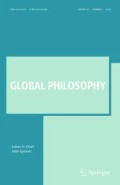Abstract
The big bang idea is not only a dominant idea in cosmology but also a very successfully idea out of cosmology. Although sometimes just in metaphorical sense, the big bang idea is present, since some decades, in a variety of domains such as natural sciences, humanities, social sciences, arts, and it also has a great acceptance by the general public. Furthermore, the term Big Bang has become increasingly popular and currently it is often used with very different purposes, including commercial purposes, in contexts that have nothing to do with science, such as music, television, cinema, circus, house decoration, food, and other unexpected domains. Proposed by Gerald Holton, thematic analysis is a useful tool for studying cases like this, because it identifies and describes elements that cross and connect all areas of knowledge and culture in general (the themata) and thus can help to understand the reception, appropriation and use of certain ideas in different but contemporary disciplinary and cultural contexts, which may be involved in intellectual fashions and in styles of thought of one particular time.
Similar content being viewed by others
Notes
Luminet (1997, pp. 18–19).
Kragh (2013, pp. 32–34).
Ibid., p. 34.
Ibid., p. 35.
Halvorson and Kragh (2013).
Goodenough (2000, p. 174.)
Ibid., p. xvi.
Halvorson and Kragh (2013).
Weinberg (2010).
Kragh (2013, p. 35).
Google search, 1 May 2014.
Kragh (2013, pp. 15–17).
Interview with Fred Hoyle by Alan Lightman, 15 August 1989, Niels Bohr Library & Archives, American Institute of Physics. Quoted by Kragh (2013, pp. 16–17).
Kragh (2013, p. 35).
Holton (1975a, p. 57).
References
Goodenough U (2000) The sacred depths of nature. Oxford University Press, Oxford
Halvorson H, Kragh H (2013) Cosmology and theology. In: Zalta E (ed) The stanford encyclopedia of philosophy. http://plato.stanford.edu/archives/fall2013/entries/cosmology-theology/. Cited 6 Jan 2014
Holton G (1975a) Thematic origins of scientific thought. Harvard University Press and Kepler to Einstein, Cambridge and London
Holton G (1975b) On the role of themata in scientific thought. Science 188:328–334
Holton G (1996) Einstein, history, and other passions. AIP Press, Woodbury
Holton G (1998) the scientific imagination: case studies. Cambridge University Press, Cambridge
Kragh H (2013) What’s in a name: history and meanings of the term “big bang”. http://arxiv.org/ftp/arxiv/papers/1301/1301.0219.pdf. Cited 22 Jul 2013
Luminet JP (1997) L’Invention du Big Bang. In: Éssais de Cosmologie. Éditions du Seuil
Weinberg D (2010) From the big bang to the multiverse: translations in space and time. In: Neri L, Josiah McElheny J (eds) Josiah McElheny: a prism. Skira/Rizzoli Books, New York
Author information
Authors and Affiliations
Corresponding author
Rights and permissions
About this article
Cite this article
Barbosa, J. Big Bang, an Idea Projected Beyond Cosmology: The Possible Contribution of Thematic Analysis to the Understanding of This Success. Axiomathes 25, 181–187 (2015). https://doi.org/10.1007/s10516-014-9249-4
Received:
Accepted:
Published:
Issue Date:
DOI: https://doi.org/10.1007/s10516-014-9249-4



